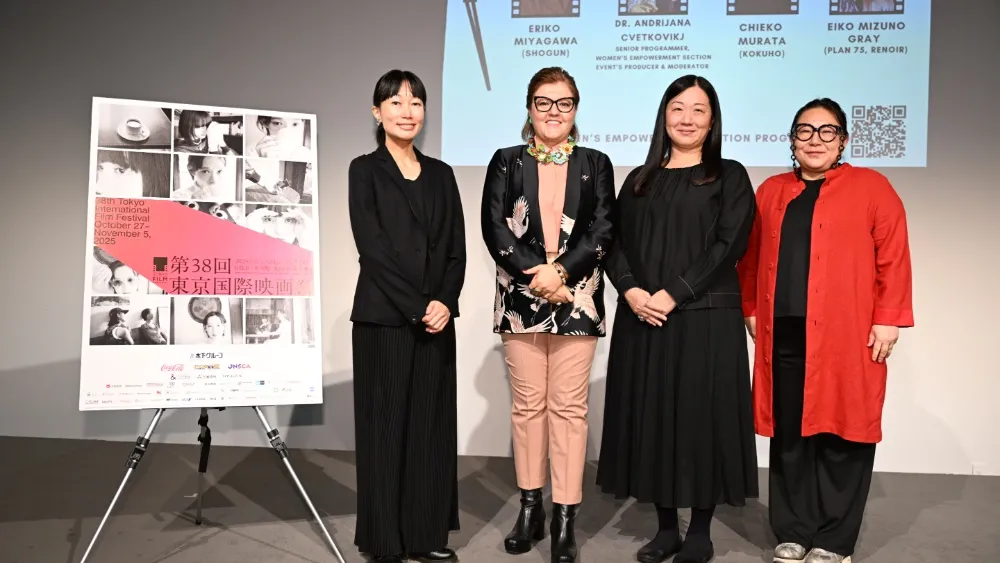Copyright Variety

Three Japanese female producers who have achieved international critical and commercial success —Miyagawa Eriko, Eiko Mizuno Gray and Murata Chieko – participated in a Tokyo International Film Festival event as part of its Women’s Empowerment section. With section curator Andrijana Cvetkovikj serving as moderator, the trio began by tracing their paths to their current profession. Co-winner of an Emmy for her work on the hit streaming series “Shogun,” Miyagawa said she got her start as an interpreter on the set of Quentin Tarantino’s “Kill Bill: Vol. 1” “I couldn’t believe how much work it was to create each shot and the chaos of it,” she said. “I fell in love with the process.” She added that working with Tarantino was both a “gift and curse because he’s a genius.” “Maybe I could have been a director, but working for him I knew that there was no way I could ever do that,” she explained. “But I love to facilitate things and I want to be part of everything and I want to know everything so producing felt natural.” Mizuno Gray began as a volunteer for the Toronto Film Festival and segued into publicity work. She then became curious about producing, “I thought if I can see the whole filmmaking process from that, from the beginning to the end, then that must be what I should try,” she said. Setting up a company, Loaded Films, with husband Jason Gray, she launched into film production. Credits include her award-winning collaborations with Chie Hayakawa, director of the 2022 Cannes Golden Camera nominee “Plan 75” and 2025 Cannes competition entry “Renoir.” Murata reminisced about studying directing, acting and cinematography at a film school in the States and realizing that “I was not good at any of it.” “So the job that left was to me was producing,” she added. Returning to Japan, she landed a job with as an executive producer’s assistant and began climbing the corporate ladder. After working as director of local production for Fox International Production and serving as Sony Pictures Entertainment’s senior vice president for production in Japan and Southeast Asia, in 2020 she became senior vice president of Aniplex, producer of the smash hit “Demon Slayer” animations. She was also a producer on this year’s live-action sensation “Kokuho.” Asked what makes a person a valuable asset as a producer, Miyagawa mentioned “an ability to listen and be flexible. “I think empathy goes a long way,” she added “Really try to put yourself in another person’s shoes and know where their priorities are coming from. Also, have clarity in terms of what your goal is and what story you want to tell.” Queried about her part in the record-breaking success of “Kokuho,” the Lee Sang-il drama set in the world of Kabuki, Murata modestly said she couldn’t take credit. “It’s all up to the directors and the crew members, the scriptwriter and our great actors,” she said. “But my experience helped me a lot in meeting with international film festival programmers and international filmmakers and producers. They gave me a lot of input.” What they told her was they missed the great masterpieces of Ozu, Kurosawa and other titans of Japanese cinema’s Golden Age. “They asked me why there were no films like that in Japan now” she said. “And my answer was okay, let’s try to make that kind of grand studio film.” In other words, “Kokuho,” with its lavish sets and costumes, decades-spanning story and three-hour running time. In contrast to Murata’s corporate trajectory, Mizuno Gray has always been an independent producer, who has had to choose projects on her own instead of having them assigned to her. “You have to be very selective,” she said. And for her a big part of the selection process is “understanding the creator’s vision and reasoning and storytelling.” “So first I will try to get know filmmakers not just for their creative ability, but also as a person,” she added. “And if we can align our vision I will try to make it happen as a producer.” For Miyagawa, packaging is “very important.” By that she means not only the director, scriptwriter and cast, but also the story: “It’s really the balance of all of that,” she explains. Murata said that what sets her apart from the other two producers is that “I’m a company employee in Japan, so I will make a film or TV show that makes money for my company.” Earning $109 million since its June release, the third-highest total ever for a live-action Japanese film, “Kokuho” ticked that particular box emphatically. “Talent is also very, very important,” Murata added. “Because this business is all about bringing money into talent.”



